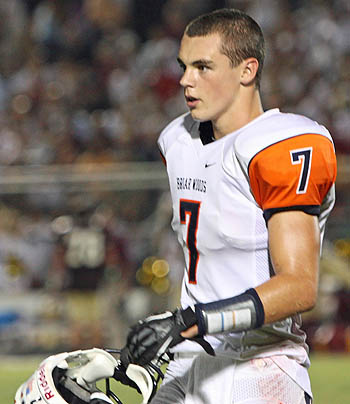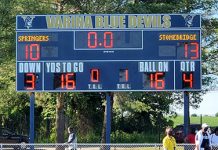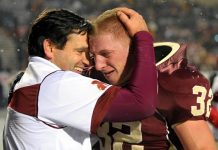It was a hot August night in 2010 when Briar Woods took the field; starting at quarterback was a young man who barely looked bigger than the large number 7 on the front of his jersey. He was listed at 5-foot-10, 150 pounds, but that looked only to be true if he were weighed in his uniform and had just finished eating a couple of triples from Wendy’s.

Then on the first play of the game, the horse Briar Woods expected to ride all season – star running back Michael Brownlee – went down with a leg injury and would be lost until the final games of the season.
Things, as they say, just got real for freshman starting quarterback Trace McSorley.
It’s probably safe to say at that moment no one on the planet expected to one day see McSorley have 105 touchdown passes and three state championships to his credit, plus be only two games away from setting a record that can never be broken: being a starting QB on 4 straight state championship teams. But the seeds of all that success were planted that night.
At the time, he wasn’t even Briar Woods’ sole quarterback, alternating with Mark Leith. But with 2:37 left, the ball at his own 9 and trailing 8-7, McSorley was under center. Long passes to Alex Carter (now at Stanford) and Cam Serigne (now at Wake Forest) moved the ball to midfield. On a key 4th down, McSorley stayed cool and found Scott Rolin (now at Virginia Tech) for a 29-yard gain. The plays would set up David Clements’ winning field goal.
“Trace was never a very loud person nor was I; we let Brownlee do all that stuff,” Rolin remembered of that night. “But you could just tell Trace had a calming effect and ice in his veins.”
It would not be accurate to say his success that night was a surprise to anyone in the tight-knit sports community of Brambleton. Trace was a star in youth football and his competitiveness among friends was legendary. You know that guy who is a pain in the neck whether it’s golf, video games, racing to the dinner table or playing cards because he always has to win? That’s Trace McSorley. No game is “just for fun,” as to Trace, Herm Edwards’ famous “You Play To Win The Game” isn’t a speech. It’s a way of life.
“He has a very Michael Jordan-like attitude whether we were playing a football game, playing pickup basketball or playing video games,” Serigne recalled. He always did everything to win and never accepted losing.” Serigne remembered once when Trace was staying over at his house and they were playing a video football game where the more you played, the more you could increase your players’ attributes to the point where you could possibly win the game’s Heisman Trophy.
“It was getting really late and I was tired and wanted to go to sleep but Trace didn’t want to stop playing because he wanted to get his player the Heisman,” Cam laughed. “I ended up falling asleep and when I woke up, Trace was still playing…but he had won the Heisman.”
The Jordan-esque comparisons don’t stop at merely being competitive. Jordan was also known for his religious-like fervor when it came to workouts, and McSorley has been bitten by that bug too. “At 14, he was running up the hill on our street, working on his footwork and perfecting his quarterback skills,” Rolin said. “At 14. That’s why I’m not surprised he’s had so much success.”
But just like Jordan, he also found out early that his best wasn’t quite good enough at the time. Jordan was famously cut from his high school basketball team in the 10th grade; McSorley was too young in the 8th grade to try out for the varsity so he instead tried to make the junior varsity. He too, got cut.
“That day was tough on him,” said his father, Rick McSorley. “It definitely hurt him because he wanted to be with Cam and Matt (Rolin) and thought he belonged. Those were his guys and closest friends and he wanted to play with them.”
Right after practice that day, the McSorley family went to Glory Days, where the Serignes, the Rolins, and Brownlee joined them to needle Trace and cheer him up. He was down because he couldn’t play with his football family that season, so his football family came to him and told him to keep his head up. “I wouldn’t say it made him any more motivated,” Rick McSorley said, “but it definitely left a mark.”
So Trace McSorley played on the freshman team while amping up his game to the point he seemed like a player/coach. He played every position he could, including quarterback, safety, kicker, kick returner, punter and punt returner. He took on a leadership role, giving pregame speeches and postgame pep talks. He was on the sidelines during every varsity game that year, was in the locker room before and after every game and got to see how the Briar Wood staff coached the team. He heard the speeches, heard people being chewed out for their mistakes and heard them praised for exceptional results. He became part of the team without being on the team, so when opportunity knocked, he would be ready.
Opportunity came that night in August, and Trace made the most of it. But the team still struggled early going 2-2 in those first 4 games, and while his teammates were certainly behind him, opponents didn’t mind telling him he might be too small and young for the game. Rolin remembers a play in a game against Liberty where an opposing player knocked McSorley out of bounds, then offered several unprintable editorial comments as to the young quarterback’s prospects.
“Trace just got up and didn’t back down,” Rolin said. “He’s not backing down from anyone.”
With each week, the passing game became more potent, easing the loss of Brownlee in the running game. In the sixth game of the year, Briar Woods edged 2-time defending state champion Broad Run 20-13 and the team would not lose again the rest of the year. With Brownlee back for the playoffs, the Falcons blew out Cortland and Harrisonburg to win their first state title.
Usually when you complete 62 percent of your passes, throw 19 touchdown passes and lead your team to a state championship, you start becoming the darling of the recruiting services. In McSorley’s case, that wasn’t necessarily true as schools paid more attention to his size than the results he was ringing up on the field.
“Trace wasn’t the biggest kid out there,” acknowledged former BW running back Cory Colder. “But it’s the things that you can’t measure with a measuring tape or stopwatch which make him such a special player: his heart, strong leadership skills, and his tremendous work ethic.”
Because colleges weren’t seeing this, McSorley developed another famous Jordan attribute: he started playing with a chip on his shoulder when he was facing teams that did have heavily recruited athletes. If the wide receiver across from him was the apple of some college’s eye, Trace would make it his personal mission to shut him down. If the other team had a highly-rated QB, he wasn’t going to be outplayed.
In time, schools noticed that – as well as the fact he grew to be much bigger as a senior than as a 9th grader – and the offers came. McSorley has committed to play for Vanderbilt in the Southeastern Conference next year.
“Looking at him on the sidelines when he was an 8th-grader to now is as different as night and day,” said former classmate JT Partlow. “As a freshman he was more of a pocket passer. Now we’re watching what is arguably the second-greatest career of a Virginia high school quarterback behind Philip Sims at Oscar Smith. Even as an alumnus who has been gone for several years, Trace will draw us back to the stadium on a Friday when we’re in town so you can see what he’s going to do next.”
McSorley is a relatively shy and humble young man, so I didn’t even bother to contact him for this story. He probably wouldn’t have been comfortable talking about himself and would have ended up deflecting the questions to how good Serigne, Rolin, Brownlee and Colder were. As his Dad noted, “Trace didn’t come to Briar Woods trying to be the best QB in school history. He wanted to become a great football player, but more importantly he wants to be a great teammate. That’s the goal. If you’re a great teammate everything else falls in to place.”
But I did, the night of the Milbrook game, swap emails with Briar Woods Coach Charlie Pierce about his young quarterback, asking him how good he thought he could be. To say Charlie that night did a great imitation of Nostradamus would be an understatement.
“Trace has a feel for the game, and at his age that is special,” Pierce replied. “He’s mature beyond his years. I think he has a lot of good years to come.”
Four years, 105 touchdown passes, 56 wins, 9,500 yards and 3 state championships later, I think Charlie was right.
This Trace McSorley kid is going to be good.

